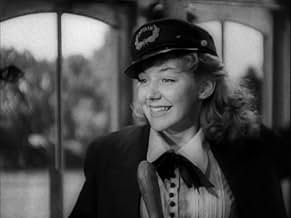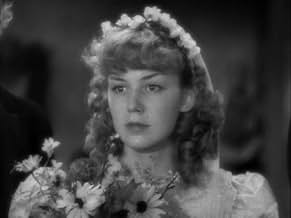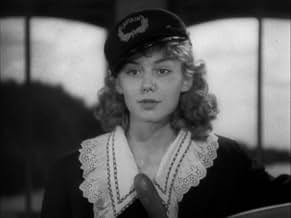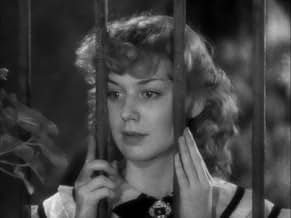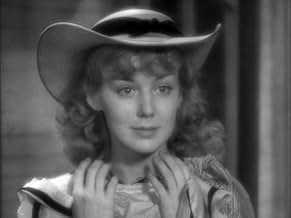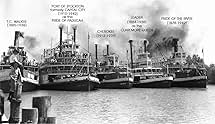IMDb रेटिंग
6.9/10
1.4 हज़ार
आपकी रेटिंग
अपनी भाषा में प्लॉट जोड़ेंA Louisiana con man enters his steamboat into a winner-take-all race with a rival while trying to find a witness to free his nephew, about to be hanged for murder.A Louisiana con man enters his steamboat into a winner-take-all race with a rival while trying to find a witness to free his nephew, about to be hanged for murder.A Louisiana con man enters his steamboat into a winner-take-all race with a rival while trying to find a witness to free his nephew, about to be hanged for murder.
- निर्देशक
- लेखक
- स्टार
- पुरस्कार
- कुल 3 जीत
C.E. Anderson
- Jailer
- (बिना क्रेडिट के)
Sam Baker
- Undetermined Role
- (बिना क्रेडिट के)
William 'Billy' Benedict
- Breck
- (बिना क्रेडिट के)
Heinie Conklin
- Jailbird
- (बिना क्रेडिट के)
Tex Cooper
- Townsman
- (बिना क्रेडिट के)
D'Arcy Corrigan
- Hangman
- (बिना क्रेडिट के)
Luke Cosgrave
- Labor Boss
- (बिना क्रेडिट के)
फ़ीचर्ड समीक्षाएं
Snake oil salesman Doctor John Pearly (Will Rogers) makes a bet with Captain Eli to race steamboats. He has to fix up an old steamboat. He hopes to have his nephew Duke as the pilot. Duke brings along swamp gal Fleety Belle who was abused by her family. He had killed a man. It's self-defense but the only witness is preacher The New Moses who has since gone away. Following John's advice, Duke turns himself in. He is set to hang unless the preacher is found.
There is a basic structural issue with the premise and the movie. The movie wants to be a fun, light-weight, silly steamboat race. On the other hand, nephew Duke is threatened with hanging and there is supposed to be danger. These two things often do not mix well together. For example, they need to find The New Moses who is often found on the river. One would expect John to be piloting his steamboat up and down the river spreading the word and looking for the preacher. Instead, he ends up spending his time racing and by happenstance run into the preacher. The race is plenty fun and then we're reminded that Duke is about to be hanged. It's a wacky hanging party.
There is a basic structural issue with the premise and the movie. The movie wants to be a fun, light-weight, silly steamboat race. On the other hand, nephew Duke is threatened with hanging and there is supposed to be danger. These two things often do not mix well together. For example, they need to find The New Moses who is often found on the river. One would expect John to be piloting his steamboat up and down the river spreading the word and looking for the preacher. Instead, he ends up spending his time racing and by happenstance run into the preacher. The race is plenty fun and then we're reminded that Duke is about to be hanged. It's a wacky hanging party.
It's funny to think that when this film was made, it was about a time in the early 1890's, only 35 years earlier than it's production. Now we are looking back almost 75 years at the film itself. I expected a light wacky comedy, but there is definitely a well-rounded plot here revolving around murder in self-defense. Will Rogers gives a very skilled and sympathetic performance, but some of the more hilarious gags in this are gifts from the writers.
The sheriff/preacher's wedding speech goes right up there with Donald Sutherland's in "Little Murders" for sheer comic value.
A great throwaway gag involves the search for the New Moses, when they accidentally run into the New Elijah instead!
Steppin Fetchit, while no great symbol for African Americans, actually plays against his lazy type in this, and his hard work and quick thinking actually save the day on a couple occasions.
A great (and uncommon) saw-playing musical interlude!
To me, the only major weakness was Ms. Shirley as the ingenue. She was quite likable, but did not seem to have lived as hard as her character was supposed to have.
All told, a winner of a film for fans of the 1930's view of the 1890's.
The sheriff/preacher's wedding speech goes right up there with Donald Sutherland's in "Little Murders" for sheer comic value.
A great throwaway gag involves the search for the New Moses, when they accidentally run into the New Elijah instead!
Steppin Fetchit, while no great symbol for African Americans, actually plays against his lazy type in this, and his hard work and quick thinking actually save the day on a couple occasions.
A great (and uncommon) saw-playing musical interlude!
To me, the only major weakness was Ms. Shirley as the ingenue. She was quite likable, but did not seem to have lived as hard as her character was supposed to have.
All told, a winner of a film for fans of the 1930's view of the 1890's.
10zootjim
I first saw this movie with my grandfather fifty years ago. Our small-town theater was having classic movie month and Will Rogers was my grandfather's favorite. For a ten-year old boy this movie made a lasting impression of the freedom and romance once available to us in America but now lost forever. Aside from the instantly believable story line about an uncle and his orphaned nephew going together to buy an aging Mississippi River steamboat the pathos applies superbly to this day. The young man meets a girl, gets in a fight over her and is in trouble with the law. The kind uncle moves heaven and earth to help his deceased sister's son. The characters are all period and realistic according to my grandfather who knew people just like that. America was a religious nation in those days, especially the South, so the use of religious terms in common speech is authentic. The thing to watch for in this film is the steamboat race. In 1935 the steamboat's day was already past, and to find that many operating steamboats to make the film must have been a task. Then...listen closely to the melodious whistles. Different pitches and echoes, made by live steam. Steam power built modern America, and the sound of a live steam whistle, once so common, is all but vanished now. I have to yield to my grandfather's opinion of the movie, not having lived in those times myself, and he said it was quite authentic, down to the use of pitch, kerosene or whatever was handy to get more speed out of the engines. The fact that a regular person felt he could go speak to a state governor in person is also part of our American heritage. There was not the class distinction (at least among whites) that there is today. This movie is a priceless treasure, and youngsters definitely need to see it. Anne Shirley, swamp girl, becomes sweet because she admits she is won over by the tenderness of Uncle John.
Endings are important, and even in light comedies with adventure undertones, those endings end up helping to shape everything that came before it. I was a bit flustered by the first hour or so of John Ford's Steamboat Round the Bend, finding things to like but frustrated at the extraordinary loose nature of the telling, but the ending brought everything together in rip-roaring fashion. Will Rogers' final filmed role before his airplane crash that killed him ends up being a fancifully entertaining trip down the Mississippi.
Rogers plays Doctor John Pearly, a conman selling a tonic he says comes from a recipe by Pocahontas herself, but which is literally just rum, to people on the river as he makes his way up to find his own dilapidated riverboat, ready for him to refurbish and put back on the water. When he first arrives at his new home on the river his nephew Duke (John McGuire) arrives with a swamp woman in tow, Fleety Belle (Anne Shirley). Duke had killed Belle's father in an act of self-defense after they had been seeing each other secretly for some time, but the only witness to the events that could possibly clear his name is New Moses (Berton Churchill), a bearded temperance preacher who travels up and down the river, converting wayward souls. However, before anyone can find New Moses, the law arrests Duke, and John forces Belle's family away by lying and saying that Duke and Belle have married.
This was a strong start, and then the movie just kind of begins to flounder for a while. John takes Belle on his refurbished boat up and down the river nominally looking for Old Moses, but they take on a traveling museum of sorts, filling the hold with mannequins of famous historical figures with a lot of talk about how to Americanize the figures to help attract customers. Some small adventures, misunderstandings, and scrapes dominate the middle section of this film around the museum, and while most of it is very lightly amusing, it feels like the movie itself has gotten lost. There's suddenly no urgency about Duke or his plight. It's kind of odd.
After a brief marriage ceremony to make John's lie of Belle and Duke a reality, Duke gets taken down to Baton Rouge for execution. John ends up chasing after Duke and gets caught up in a riverboat race, forced to join as the only way to go further south on the Mississippi and developing a rivalry with Captain Eli (Irvin S. Cobb), pilot of another steamboat. It's here where the movie reclaims its focus and, more entertainingly, a strong sense of energy as the film becomes a race against the clock on two different fronts, the literal race against the other steamboats and the need to get to Baton Rouge before Duke's execution. They may not have much more of a plan than that, but they have to go. In swift order, though, they encounter New Moses preaching on the side of the river, rope him in (literally), and speed off, burning more and more of the riverboat's ephemera to fuel the engines from the lifeboats to, as the race becomes more desperate, the mannequins themselves. Watching New Moses in all of this is a treat, and when he discovers that John has a supply of the Pocahontas cure all on board, also that it's just rum, he has the idea of throwing them in to heat the engine and propel them faster. It's kind of wild stuff, and it's a very fun comedic crescendo for the whole picture.
The film was apparently cut down by about twenty minutes after Will Rogers' death, mostly in the ending, forcing a final shot of Rogers as John reclining on the deck of his boat. It's a nice moment for the character as well as the actor.
This is the first time that Rogers worked with Ford where it felt like Rogers was actually playing a character instead of just himself, and it's a nice change of pace. He doesn't dominate the film like he does in the other two films (Doctor Bull and Judge Priest) to varying degrees of success, allowing the story to play through without completely overrunning everything else. He's the central character for sure, but he allows space for Annie Shirley, as his primary counterpart, to shine in bright and cheerful fashion.
It really could have used a rewrite in its middle section, a section that dragged the film down a good bit, but that ending is really something else, a madcap race with real stakes and cut quickly for an all around good time. It really won me over by the end.
Rogers plays Doctor John Pearly, a conman selling a tonic he says comes from a recipe by Pocahontas herself, but which is literally just rum, to people on the river as he makes his way up to find his own dilapidated riverboat, ready for him to refurbish and put back on the water. When he first arrives at his new home on the river his nephew Duke (John McGuire) arrives with a swamp woman in tow, Fleety Belle (Anne Shirley). Duke had killed Belle's father in an act of self-defense after they had been seeing each other secretly for some time, but the only witness to the events that could possibly clear his name is New Moses (Berton Churchill), a bearded temperance preacher who travels up and down the river, converting wayward souls. However, before anyone can find New Moses, the law arrests Duke, and John forces Belle's family away by lying and saying that Duke and Belle have married.
This was a strong start, and then the movie just kind of begins to flounder for a while. John takes Belle on his refurbished boat up and down the river nominally looking for Old Moses, but they take on a traveling museum of sorts, filling the hold with mannequins of famous historical figures with a lot of talk about how to Americanize the figures to help attract customers. Some small adventures, misunderstandings, and scrapes dominate the middle section of this film around the museum, and while most of it is very lightly amusing, it feels like the movie itself has gotten lost. There's suddenly no urgency about Duke or his plight. It's kind of odd.
After a brief marriage ceremony to make John's lie of Belle and Duke a reality, Duke gets taken down to Baton Rouge for execution. John ends up chasing after Duke and gets caught up in a riverboat race, forced to join as the only way to go further south on the Mississippi and developing a rivalry with Captain Eli (Irvin S. Cobb), pilot of another steamboat. It's here where the movie reclaims its focus and, more entertainingly, a strong sense of energy as the film becomes a race against the clock on two different fronts, the literal race against the other steamboats and the need to get to Baton Rouge before Duke's execution. They may not have much more of a plan than that, but they have to go. In swift order, though, they encounter New Moses preaching on the side of the river, rope him in (literally), and speed off, burning more and more of the riverboat's ephemera to fuel the engines from the lifeboats to, as the race becomes more desperate, the mannequins themselves. Watching New Moses in all of this is a treat, and when he discovers that John has a supply of the Pocahontas cure all on board, also that it's just rum, he has the idea of throwing them in to heat the engine and propel them faster. It's kind of wild stuff, and it's a very fun comedic crescendo for the whole picture.
The film was apparently cut down by about twenty minutes after Will Rogers' death, mostly in the ending, forcing a final shot of Rogers as John reclining on the deck of his boat. It's a nice moment for the character as well as the actor.
This is the first time that Rogers worked with Ford where it felt like Rogers was actually playing a character instead of just himself, and it's a nice change of pace. He doesn't dominate the film like he does in the other two films (Doctor Bull and Judge Priest) to varying degrees of success, allowing the story to play through without completely overrunning everything else. He's the central character for sure, but he allows space for Annie Shirley, as his primary counterpart, to shine in bright and cheerful fashion.
It really could have used a rewrite in its middle section, a section that dragged the film down a good bit, but that ending is really something else, a madcap race with real stakes and cut quickly for an all around good time. It really won me over by the end.
This film debuted just after Will Rogers was tragically killed in a plane crash. Because of this, "Steamboat Round The Bend" is one of the last chances anyone had to see him in film. While it's not among his best films, it's pretty good and well worth seeing.
Rogers plays a 'snake oil' salesman (a guy who sells fake cure-all medicines) has been saving for some time to buy a dilapidated old steamboat. His plan is to run it with his nephew, Duke. However, when Duke arrives, he tells his Uncle that he's just killed a man in self-defense and has brought a woman from the swamps with him. Uncharacteristically, Rogers' character is nasty and voices a strong prejudice against swamp people (no, not the comic book character but people who live in the swamplands). Considering what a nice guy he was in his other films AND his famous quote ("I never met a man I didn't like"), this prejudiced attitude DID seem pretty strange--as did his playing a bit of a swindler.
Fortunately, his character DID improve as the film progressed. Later, instead of hating this girl (Anne Shirley), he felt sorry for her and cared for her when her beloved was jailed for this killing. However, what is Rogers to do--as the Nephew is due to be hung AND he's made a bet to beat a rival captain in the big race? tune in and see for yourself in this gentle slice of Americana.
As I said above, Rogers' character wasn't nearly as sweet as he'd been in other movies. But he was likable enough AND the rest of the cast did a good job--as too often in the past the film was all on Rogers' shoulders--here it's a nice ensemble cast. Berton Churchill (in the weirdest role of his career), Eugene Palette and Steppin Fetchit are on hand to provide some nice support--and Fetchit's a little easier to take as his horrible stereotypical act isn't as obvious and offensive as usual. Overall, well worth seeing.
Rogers plays a 'snake oil' salesman (a guy who sells fake cure-all medicines) has been saving for some time to buy a dilapidated old steamboat. His plan is to run it with his nephew, Duke. However, when Duke arrives, he tells his Uncle that he's just killed a man in self-defense and has brought a woman from the swamps with him. Uncharacteristically, Rogers' character is nasty and voices a strong prejudice against swamp people (no, not the comic book character but people who live in the swamplands). Considering what a nice guy he was in his other films AND his famous quote ("I never met a man I didn't like"), this prejudiced attitude DID seem pretty strange--as did his playing a bit of a swindler.
Fortunately, his character DID improve as the film progressed. Later, instead of hating this girl (Anne Shirley), he felt sorry for her and cared for her when her beloved was jailed for this killing. However, what is Rogers to do--as the Nephew is due to be hung AND he's made a bet to beat a rival captain in the big race? tune in and see for yourself in this gentle slice of Americana.
As I said above, Rogers' character wasn't nearly as sweet as he'd been in other movies. But he was likable enough AND the rest of the cast did a good job--as too often in the past the film was all on Rogers' shoulders--here it's a nice ensemble cast. Berton Churchill (in the weirdest role of his career), Eugene Palette and Steppin Fetchit are on hand to provide some nice support--and Fetchit's a little easier to take as his horrible stereotypical act isn't as obvious and offensive as usual. Overall, well worth seeing.
क्या आपको पता है
- ट्रिवियाThe film was released shortly after Will Rogers' death on 15 August 1935 from an airplane crash near Point Barrow, Alaska with noted aviator Wiley Post. Originally, the ending of the film had him waving goodbye to the character played by Irvin S. Cobb, but the ending was changed to avoid the audience thinking he was saying goodbye to them, which may have caused them to leave the theater in tears. Cobb urged the ending not be changed. The review which appeared in Variety 25 September 1935 indicated the film had been "announced" as 102 minutes, but had been considerably shortened, which no doubt accounts for some problems in continuity and the abrupt ending.
- गूफ़At the end of the race, an official on a stand is waving a black and white checkered flag. A title card at the beginning of the film states this film is set in the early 1890s. The earliest known use of a checkered flag to signify the end of a race was for the 1906 Vanderbuilt Cup auto race.
- भाव
New Moses: I've got souls to save.
Doctor John Pearly: No, you got a life to save, and the Lord don't care which one of your jobs you do first.
- कनेक्शनFeatured in Directed by John Ford (1971)
- साउंडट्रैकSteamboat Round the Bend
(1935) (uncredited)
Music by Oscar Levant
Lyrics by Sidney Clare
Sung by an unidentified chorus during opening sequence and played during closing credits
टॉप पसंद
रेटिंग देने के लिए साइन-इन करें और वैयक्तिकृत सुझावों के लिए वॉचलिस्ट करें
- How long is Steamboat Round the Bend?Alexa द्वारा संचालित
विवरण
- रिलीज़ की तारीख़
- कंट्री ऑफ़ ओरिजिन
- भाषा
- इस रूप में भी जाना जाता है
- Steamboat Bill
- फ़िल्माने की जगहें
- San Joaquin River, कैलिफोर्निया, संयुक्त राज्य अमेरिका(River and Delta at Stockton: steam ships, rivers channels)
- उत्पादन कंपनी
- IMDbPro पर और कंपनी क्रेडिट देखें
- चलने की अवधि
- 1 घं 22 मि(82 min)
- रंग
- पक्ष अनुपात
- 1.37 : 1
इस पेज में योगदान दें
किसी बदलाव का सुझाव दें या अनुपलब्ध कॉन्टेंट जोड़ें

